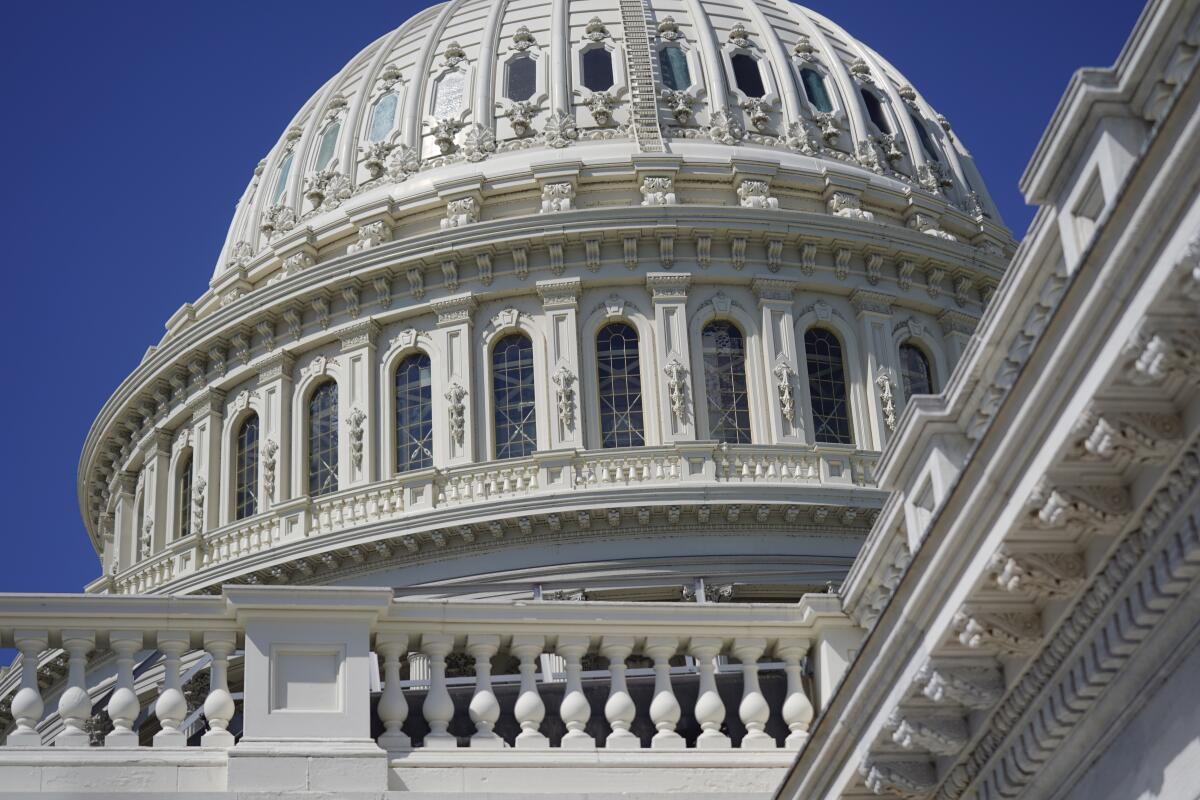Biden signs bill to avert government shutdown and aid Ukraine

- Share via
WASHINGTON — President Biden signed into law Friday a bill that finances the federal government through mid-December and provides another infusion of military and economic aid to Ukraine after lawmakers acted to avert a partial government shutdown set to begin after midnight.
The House had passed the bill earlier in the day by a vote of 230 to 201.
Republicans overwhelmingly opposed the measure. Some wanted to extend government funding into January when, based on the results of the midterm elections, it’s possible they’ll have more leverage over setting federal spending for the full fiscal year. Others argued the measure needed to do more to address border security.
Democrats said passing the bill was important to helping Ukraine as well as victims of recent natural disasters in the U.S., including Hurricane Ian, as it provides a Federal Emergency Management Agency disaster fund with a year’s worth of money up front rather than for two and a half months.
“Turn on the news. Look what’s happening in Florida right now. Look at what happened to Puerto Rico. Look at what’s happening in Alaska. I mean, people need help,” said Rep. Jim McGovern (D-Mass.). “And look at what’s happening in Ukraine. Do we support helping preserve democracy in Ukraine or not? That’s what’s at stake here.”
But Republicans complained the bill brought to the floor was not subject to bipartisan negotiations in the House and didn’t reflect their priorities.
“We know we have a crisis on the southern border. You can turn on the television every night. You can look at the fentanyl pouring into the country, You can see the tragedy of human trafficking. Is there anything in this bill that asks us to do anything different, anything new?” said Rep. Tom Cole (R-Okla.). “No, you just ask, ‘Please allow us to continue the current state of affairs on the southern border.’ That is a travesty.”
The bill finances the federal government through Dec. 16 and buys lawmakers more time to agree on legislation setting spending levels for the 2023 fiscal year. The bill generally keeps spending at current levels, though it does provide more than $12.3 billion in Ukraine-related aid.
That money will go to provide training, equipment and logistics support for Ukraine‘s military, help its government provide basic services to its citizens, and replenish its U.S. weapons systems and munitions.
“This contribution ensures we continue upholding our moral responsibility to support the people of Ukraine in the face of a vicious invasion that continues to demand decisive action by us,” said Rep. Rosa DeLauro (D-Conn.), chair of the House Appropriations Committee.
Disaster assistance was also attached to the stopgap bill, including $2.5 billion to help New Mexico communities recover from the Hermit’s Peak/Calf Canyon fire, the largest wildfire in the state’s history; $2 billion for a block grant program that aids the economic recovery of communities affected by recent disasters; and $20 million for water and wastewater infrastructure improvements previously authorized for Jackson, Miss.
“We cannot leave communities behind that are still picking up the pieces from disastrous floods, wildfires and hurricane, and even basic water system failures,” said Rep. Debbie Wasserman Schultz (D-Fla.).
The bill would provide an additional $1 billion for a program that helps low-income households heat their homes. And it would transfer $3 billion from a Pentagon aid program to the State Department for continued Afghan resettlement operations.
Lawmakers also included a reauthorization of the Food and Drug Administration’s user fee agreements for five years, which ensures the agency can continue crucial product safety reviews and won’t need to issue pink slips for thousands of employees working on drug and medical device applications.
One thing missing from the bill is the billions of dollars in additional funding that Biden sought to aid the response to COVID-19 and MPX. Republicans criticized the health spending as unnecessary.
The White House said the money would have been used to accelerate the research and development of vaccines and therapeutics, prepare for future COVID variants and support the global response.
More to Read
Get the L.A. Times Politics newsletter
Deeply reported insights into legislation, politics and policy from Sacramento, Washington and beyond. In your inbox three times per week.
You may occasionally receive promotional content from the Los Angeles Times.










